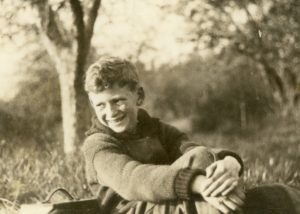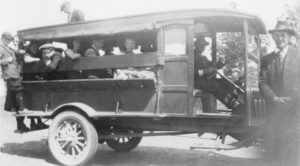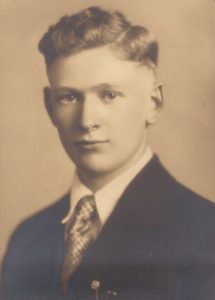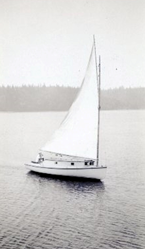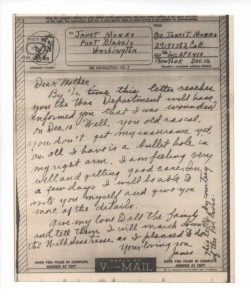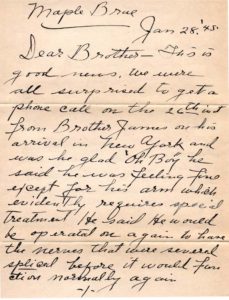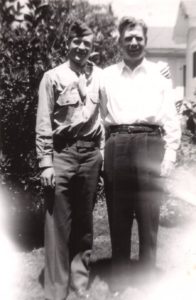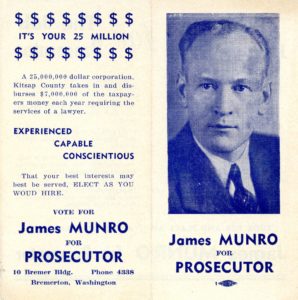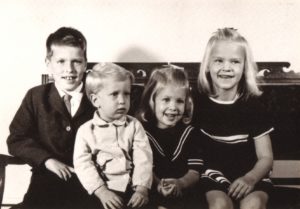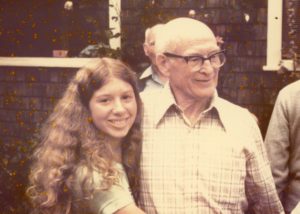James Munro
James T. Munro of Bainbridge Island, Washington
James Thomas Munro was born on November 13th, 1909 at Crystal Springs, Bainbridge Island, Kitsap County, Washington. He was the tenth and youngest child of Alexander and Janet (Montgomery) Munro and a first generation Scottish American. His family had a small farm on Bainbridge overlooking Port Orchard Bay. The location was then called Nibbeville, platted by Civil War Congressional Medal of Honor recipient, John Nibbe. Later an adjoining neighbor, Captain James S. Gibson, built a pier or boat landing on the Munro’s beach and it became known as Gibson’s Landing, a regular stop for boats of the Mosquito Fleet.
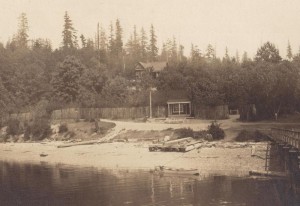
Crystal Springs Family Place abt 1910; Family Home in Background; Munro Store in foreground; Gibson’s Landing to right.
Jimmy’s brothers, Duncan and Bill, ran a country store near the boat landing, providing neighbors with staples ranging from ice to coffee, flour to candy. The family farm provided eggs, milk, strawberries, apples, vegetables and some meat. Other supplies, like flour, coal oil and grain, came in by boat or horse drawn dray. Two hundred pound blocks of ice were delivered by steamboat and dropped into the bay. The boys would float them to shore, haul them to the store with a horse and sledge, and pack them in the ice house. Later they would saw the ice into smaller blocks for delivery to their neighbors’ iceboxes.
Jimmy grew up playing on the farm, boating in the bay and going to school at the one-room Crystal Springs and Pleasant Beach schools. His oldest brother, John, was on contract as the Island’s first bus drivers.
Jimmy’s brothers and sisters graduated from eighth grade at the Island schools and attend Queen Ann High School in Seattle. Jimmy was in the first class to go all four years at the new Bainbridge Island High School, graduating in 1928. He was on the debate and track teams and was a Yell Leader. He was also credited with suggesting the ‘Spartans’ as the school mascot. According to classmate Haydon Callahan, the new school was deadlocked on a vote for mascot. Jimmy Munro jumped up and gave such a compelling speech, that a majority of students switched their vote and the Bainbridge SPARTANs name was born.
James and his brother Gordon went to dances with honey bee drones tied to their lapels by a thread. The drones couldn’t sting and the brothers enjoyed the attention and flair. James also helped Gordon build his first sail boat on the beach in front of the family home, and the two spent many years sailing together.
After high school Jimmy studied pre-law at the University of Washington, the first member of the family to graduate from college. The Depression was on and money was tight, but Uncle Lachlan Montgomery helped him finance his education.
It was an interesting time in Washington State. Worker’s rights and trade unions, including unions for college professors, were heated topics. Communism was hotly debated on and off campus. In 1932 Jimmy started law school at the University of Washington. At about the same time, there was a movement for mandatory enrollment of college students in the Associated Student Body, with an ASB fee nearly equal to tuition. Jimmy was an active and vocal opponent. His side ‘won’ and enrollment in the ASB remains voluntary. Of course there was a down side. One of his Law School professors was a leader on the other side of the issue and James transferred to the University of Colorado.
The Depression was in full swing when James graduated from Law School. He moved back to Kitsap County and started to build a law practice. It was slow and painful. After an unsuccessful run for County Prosecutor, the City of Port Orchard hired him as their first City Attorney and Justice of the Peace. Port Orchard was a little ‘Gretna Green’ at that time, where marriages were conducted without a waiting period or publication. It served young couples in a hurry for one reason or another. It also served the higher echelon who wanted to marry without publicity. The job kept James afloat while he built his practice.
It was a sixty plus mile drive from the Munro home on Bainbridge Island to the Kitsap County Courthouse in Port Orchard. James had an apartment close to the Courthouse and came home to Bainbridge on the weekends. During the summer months he would sometimes travel by boat from Crystal Springs to Port Orchard. The sixty mile road trip was reduced to three miles by water.
In 1939 James bought a brand new Ford two door sedan. He and his nephew, Duncan Munro, Jr, took the Streamliner train from Portland to Chicago, then onto Dearborn, Michigan, where they picked up the car at the factory. Before they came home, they took a side trip to Niagara Falls and then to New York City to see the World’s Fair. At the same time the two drove to Albany, New York and Jimmy made an attempt to meet Governor Tom Dewey, the Republican presidential candidate and give him an update from Washington State. Dewey was out of state and the meeting did not occur.
 After Pearl Harbor, Jimmy was anxious to serve his country. He served on the draft board and took that job very seriously. Then in December of 1942 he joined the Army and was sent to officer training school, but he fell in a trench and shattered his heal. He was marked unfit for duty, demoted to Private and sent to a unit where the men were waiting to be discharged. They expected to be processed out quickly, but it didn’t happen. They waited and waited, watching the war and anticipating the allied invasion. When the Normandy invasion finally happened, many if not most of the young officers he had trained with were killed on the beaches or in the fighting that immediately followed.
After Pearl Harbor, Jimmy was anxious to serve his country. He served on the draft board and took that job very seriously. Then in December of 1942 he joined the Army and was sent to officer training school, but he fell in a trench and shattered his heal. He was marked unfit for duty, demoted to Private and sent to a unit where the men were waiting to be discharged. They expected to be processed out quickly, but it didn’t happen. They waited and waited, watching the war and anticipating the allied invasion. When the Normandy invasion finally happened, many if not most of the young officers he had trained with were killed on the beaches or in the fighting that immediately followed.
In October of ’44 James Munro was sent to Europe as a Private in B Company, 411th Infantry Regiment, 103rd Infantry. He was thirty four years old. His military qualifications included Bar Marksman, Light Machine Gun Sharpshooter and Rifle Sharpshooter. They landed in southern France and marched toward Germany, liberating large portions of the country as they went. Losses were heavy. Jimmy was promoted to Sergeant in the field and he received several minor injuries, but no records survived documenting the promotions or injuries.
On December 10th, 1944 James Munro was out front as his squad prowled through the countryside in northern France, near the German border. When he spotted a sniper in a tower or ruined building ahead of him, he pointed to the tower while twisting to shout to his sharpshooter. At that moment, a bullet went through his outstretched arm, in the forearm and out the upper arm.
The Germans had trained young boys to be snipers and left them in the trees or buildings to kill approaching Americans as their forces retreated. Often they were only twelve or thirteen years old.
In an Army field hospital a Red Cross nurse took down the following letter to his mother:
James fully expected to return to his unit and ‘March down the Wilhelmstrass’ in Berlin, but he didn’t regain use of his arm and he was sent to New York on a transport ship. There he learned that a major nerve had been severed and the ends had died back. He couldn’t use his ‘trigger finger.’
The arm was operated on and the nerve was trimmed back to live tissue. During the operation the arm was bent up to connect the shortened nerve ends, and it took eighteen months of therapy to fully straighten. In time it regained most of the feeling and use.
While in the Army James earned the Combat Infantryman Badge, Purple Heart, World War II Victory Medal, American Theatre Medal and European African Middle Eastern Campaign Medal.
James returned to Kitsap County a war hero. He launched into his law practice, the Disabled American Veterans and the Republican Party. In 1948 he and his brother-in-law, Fred Becker, traveled to Philadelphia to serve as delegates to the Republican National Convention. James supported Thomas Dewey and Fred supported Senator Robert Taft.
Often referred to as ‘Mr. Republican’ in Kitsap County, Jimmy was immensely popular. Even though the region was a blue collar ‘lunch bucket’ area, thousands of people would ‘cross the aisle’ and vote for Jimmy. He was a likable, fun loving guy who always had a smile and a funny story to tell. He served as the ‘master of ceremonies’ for nearly every lunch and dinner in the Kitsap region at one time or another. He gave immense amounts of time for civic functions and duties. He chartered the Kitsap County Historical Society (lifetime member) and was long active in the local veterans organizations.
James was twice elected Kitsap County Prosecuting Attorney. He also served several terms as president of the county Bar Association. In the early 1970’s he established the Kitsap County Public Defender’s office providing indigent legal defense. Over his career he argued and won three precedent setting cases before the Washington State Supreme Court.
Often described as an ‘old-time lawyer and orator’ James would quote from the Bible or Shakespeare, and bring historical perspective to many cases. He also served many ‘pro bono’ hours, defending local neighbors and friends who he thought deserved legal counsel whether they had the money or not.
James cared for and supported his mother until her death in 1952. He also lived with and supported his oldest brother, John, who had contracted tuberculosis as a young man and never fully regained his health. He doted on his many nieces and nephews; taking them sailing, helping them out with a little money, giving them jobs, bailing them out of scrapes, and encouraged them to go to college. In his late forties, he started a family of his own and devoted his life to being a positive, loving and supportive father to his four children, Alec, Amy, Elizabeth and Lachlan.
There was another important side to Jimmy. For most of his life he lived on the Crystal Springs family place where he was born. It was idyllic: lovely home, fruit orchards, green fields, gorgeous beach and reminders of his parents at every turn. His sister Mary lived in her own home on the property. James loved it beyond measure and there was no place he would rather be. He had also promised his father that he would do everything in his power to make sure his mother, Uncle Lachlan, John and Mary would be able to live out their lives there, despite some very real worries; and that the extended Munro family could continue to enjoy the family place. He kept his promise.
James Munro passed away on July 7th, 1993. He was hard working and active until the day he died. Many folks will tell you that they want to die ‘with my boots on’ and Jimmy certainly did. He was riding his lawn mower when the gearshift locked in reverse and he, and the lawn mower, tumbled over the bank and down the hill. He was a loving, understanding, tough, and compassionate man; a proud soldier and a contributing ‘public citizen’ all his life.
President Teddy Roosevelt said it best:
It is not the critic who counts; not the man who points out how the strong man stumbles, or where the doer of deeds could have done them better. The credit belongs to the man who is actually in the arena, whose face is marred by dust and sweat and blood; who strives valiantly; who errs, who comes short again and again, because there is no effort without error and shortcoming; but who does actually strive to do the deeds; who knows great enthusiasms, the great devotions; who spends himself in a worthy cause; who at the best knows in the end the triumph of high achievement, and who at the worst, if he fails, at least fails while daring greatly, so that his place shall never be with those cold and timid souls who neither know victory nor defeat.
